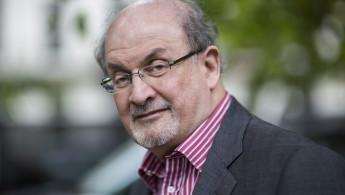Salman Rushdie stabbing suspect was 'in touch' with Iran's Revolutionary Guards
Hadi Matar, the 24-year-old suspect in the brutal stabbing of author Salman Rushdie on Friday, was in touch with Iran’s powerful Revolutionary Guards, according to Middle Eastern and European intelligence officials as reported in Vice.
The 75-year-old award-winning novelist was stabbed on stage ahead of an event at Chautauqua, New York, on Friday. His son Zafar tweeted that Rushdie had sustained 'life-changing' injuries but that his health was slowly improving.
A family statement… @SalmanRushdie #SalmanRushdie pic.twitter.com/tMrAkoqliq
— Zafar Rushdie (@ZafRushdie) August 14, 2022
British-American novelist Salman Rushdie became best known for his 1988 book titled The Satanic Verses, which sparked outrage in the Muslim world for its depiction of the Prophet Muhammed's family.
Ayatollah Khomeini, Iran’s first Supreme Leader, issued a fatwa issued against the writer in 1989 over the novel, prompting him to face regular death threats since. Rushdie spent years in hiding, before slowly re-entering public life with heavy security due to the continued risks to his life.
Iran has denied any involvement in the attack. On Monday, Iran's foreign ministry spokesperson, Nasser Kanaani Tehran "categorically" denied any link between the Islamic Republic and the attack on Rushdie, adding "no-one has the right to accuse the Islamic Republic of Iran", reported the BBC.
"In this attack, we do not consider anyone other than Salman Rushdie and his supporters worthy of blame and even condemnation," the spokesperson said.
"By insulting the sacred matters of Islam and crossing the red lines of more than 1.5 billion Muslims and all followers of the divine religions, Salman Rushdie has exposed himself to the anger and rage of the people."
The Iranian press, often linked to the state or censored, has celebrated Rushdie's stabbing. Newspapers ran images of the author comparing him to the devil and calling the attack 'divine retribution'.
Iran media call the assassination attempt on Salam Rushdie "divine retribution", "devil being blinded", a "conspiracy" for derailing nuclear talks.
— Khosro Kalbasi (@KhosroKalbasi) August 14, 2022
A paper argued the attack was "NOT an attack" on freedom of speech "unlike holocaust deniers being heavily punished".🧵 #سلمان_رشدی pic.twitter.com/LUPo29RWdk
Some media outlets, such as the Kayhan newspaper which is reportedly closely linked to Iran's Supreme Leader, proclaimed that the next targets are former US President Donald Trump and former Secretary of State Mike Pompeo.
US Secretary of State Antony Blinken has heavily criticised the Iranian response to Rushdie’s stabbing.
"Rushdie has consistently stood up for the universal rights of freedom of expression, freedom of religion or belief, and freedom of the press," Blinken said in a statement. "While law enforcement officials continue to investigate the attack, I am reminded of the pernicious forces that seek to undermine these rights, including through hate speech and incitement to violence."
"Iranian state institutions have incited violence against Rushdie for generations, and state-affiliated media recently gloated about the attempt on his life. This is despicable," he added.
Rushdie was forced into nearly a decade of hiding after the publication of The Satanic Verses while many involved in the publication or translation of the book were also targeted, sometimes fatally.
The Muslim world largely criticised the book, saying its portrayal of the basic tenets of their faith was an insult to Islam.





 Follow the Middle East's top stories in English at The New Arab on Google News
Follow the Middle East's top stories in English at The New Arab on Google News


